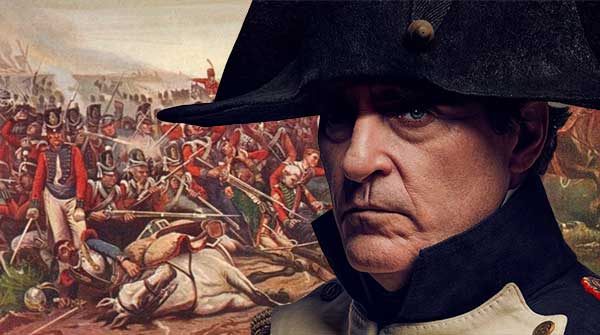The errors in Ridley Scott’s new Napoleon film are par for the course for this director
 If memory serves, I’ve seen three movie portrayals of Napoleon – Desiree (1954), War and Peace (1956) and Waterloo (1970). The specific actors involved were Marlon Brando, Herbert Lom and Rod Steiger.
If memory serves, I’ve seen three movie portrayals of Napoleon – Desiree (1954), War and Peace (1956) and Waterloo (1970). The specific actors involved were Marlon Brando, Herbert Lom and Rod Steiger.
Of the three, I liked Waterloo best, partly because of the prominence it gave to Christopher Plummer’s depiction of Napoleon’s nemesis, the Duke of Wellington. Commercially, though, it was a very expensive failure.
Now, running over two and a half hours, comes veteran director Ridley Scott’s epic take. And if that runtime isn’t long enough for you, an impending director’s cut will exceed the four-hour mark. When it’s available for streaming, you’ll be able to settle in for a cozy afternoon and evening of Napoleonic viewing.
To at least some of us, one of the things that matters with historically-based dramas is fidelity to known facts. If we know how and when something happened, we don’t want the movie providing a different rendering. Conversely, if we know something didn’t happen, we don’t want the movie to pretend it did. Other than that, we’re cool with dramatic license, artistic imagination, and varied, even contrarian, character interpretations.
 |
| Related Stories |
| Napoleon was a bitter man in his final years
|
| Napoleon’s Waterloo
|
| The unsung heroes of Waterloo
|
Alas, Scott has form in this regard.
For instance, his Robin Hood (2010) tampers with the events surrounding Richard the Lionheart’s 1199 death by having him killed as he plunders his way through France en route back from the Third Crusade. In reality, Richard returned from the crusade five years earlier, and there was no related plundering. I suspect the distortion’s purpose was to facilitate Scott reprising the anti-crusader riff from his earlier Kingdom of Heaven (2005).
Scott’s take on Napoleon has similar inventions – placing its main character at Marie Antoinette’s execution, having his troops firing on the pyramids during the Egyptian campaign, and staging a fictitious shipboard face-to-face meeting with Wellington. Whether fabrications of this sort are important is a matter of opinion.
Making a movie about someone like Napoleon also presents an interpretation problem, especially in these woke times. Is he to be rendered as an arch-villain or as a great man who bestrode his era like a colossus?
Arguments can and have been made for both.
To some, he’s an ogre, a dictator, and an imperialist who was cavalier with the lives of his soldiers and responsible for millions of deaths. When Napoleon invaded Russia in June 1812, he did so with a force of 615,000. Only 20 percent came back with him on his return six months later. His army – “swallowed up by the snows of Russia” – had lost over a half-million men.
Notwithstanding his splendid tomb at Les Invalides in Paris, official French attitudes toward Napoleon have become deeply ambivalent. Jacques Chirac (president from 1995 to 2007) didn’t consider him to be the kind of figure modern France should celebrate, while Lionel Jospin (prime minister from 1997 to 2002) described him as “an obvious failure.”
And Charles de Gaulle – the man sometimes considered France’s greatest hero – had this to say: “Napoleon exhausted the goodwill of the French, abused their sacrifices and covered Europe with graves, ashes and tears.”
Oddly, one of Napoleon’s most prominent current defenders is the English Tory historian Andrew Roberts. Although it wasn’t always how Roberts felt, the extensive research for his 2014 biography influenced the evolution of his thinking.
Roberts now sees Napoleon as having preserved the best of the French Revolution while discarding the worst. And taken in the context of the late 18th/early 19th centuries, he also views him as a great modernizer, with the scope of his reforms embracing public administration, finance and the law. Indeed, the Code Napoleon remains the basis for not only the current French legal system but also those of many other countries.
Roberts is also impressed by Napoleon’s intellectual capacity, focus, and ability to mentally compartmentalize. Then there’s his “military genius,” winning battles in all sorts of situations, some of them materially inauspicious.
As for the warmonger reputation, Roberts notes that only two of his campaigns were truly aggressive – the Peninsular War and the invasion of Russia. And even then, he sees them as essentially defensive attempts to enforce the Continental System designed to curb trade with Britain and bring it to the negotiating table.
Amidst all these contradictions, perhaps we should leave the last word with the French writer Victor Hugo. Six years after Napoleon’s 1821 death, Hugo concluded a poem about him this way: “You dominate our age; angel or demon, what does it even matter?”
Troy Media columnist Pat Murphy casts a history buff’s eye at the goings-on in our world. Never cynical – well, perhaps a little bit.
For interview requests, click here.
The opinions expressed by our columnists and contributors are theirs alone and do not inherently or expressly reflect the views of our publication.
© Troy Media
Troy Media is an editorial content provider to media outlets and its own hosted community news outlets across Canada.
